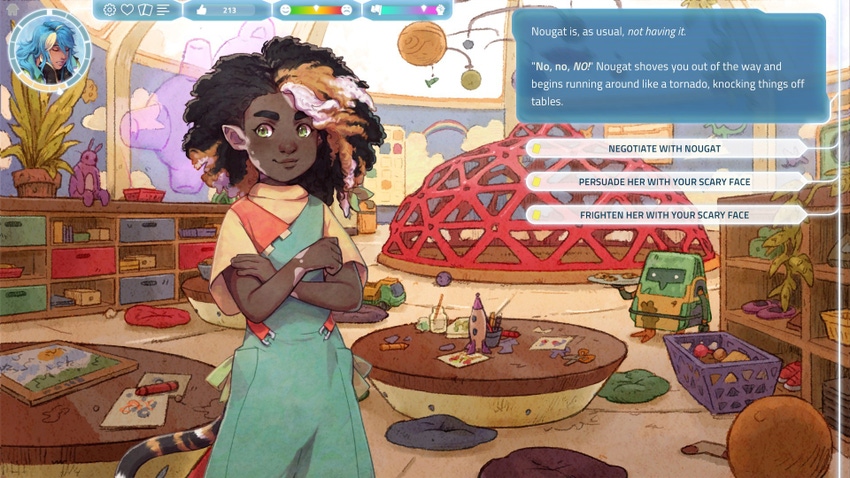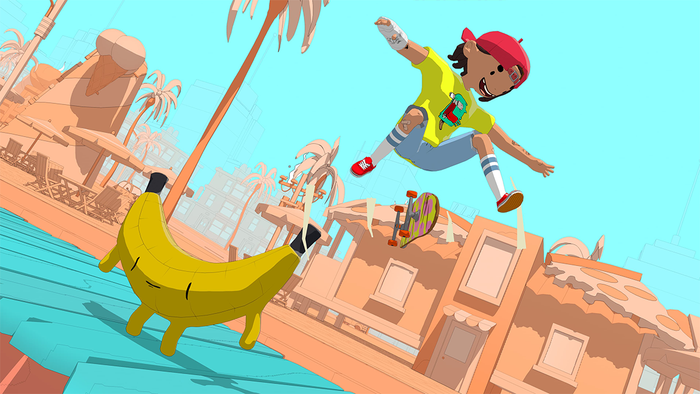I Was a Teenage Exocolonist turns life experiences into a card game
I Was a Teenage Exocolonist sees players living as teens on a strange alien world, turning their unique lived experiences and decisions into a card game.

This interview is part of our Road to the IGF series. The IGF (Independent Games Festival) aims to encourage innovation in game development and to recognize independent game developers advancing the medium. Every year, Game Developer sits down with the finalists for the IGF ahead of GDC to explore the themes, design decisions, and tools behind each entry.
I Was a Teenage Exocolonist sees players living as teens on a strange alien world, turning their unique lived experiences and decisions into a card game.
Game Developer sat down with the Designer and Creative Director of the Excellence in Narrative-nominated title, Sarah Northway, to talk about how the exciting possibilities of a dangerous alien (and raising princesses as a kid) would lead to the game's branching narrative possibilities, the way they shifted visuals and music to follow the character's path from a child with a rosy outlook to an adult who knows the challenges of this world, and the thoughts that went into turning life decisions into a card game.
Who are you, and what was your role in developing I Was a Teenage Exocolonist?
I'm Sarah Northway, the designer, coder, lead writer, and creative director of I Was a Teenage Exocolonist (Exocolonist).
What's your background in making games?
I started Northway Games with my husband in 2009. Between the two of us we've released a dozen games, including my post-apocalyptic city builder series Rebuild 1-3.

How did you come up with the concept for I Was a Teenage Exocolonist?
I love life simulators like the Sims, but the biggest influence was a Japanese series from the 90s called Princess Maker where you raise a little girl. I thought it would be interesting to play as the "princess", and see how your community and friends change as they grow up in the hardships of an alien environment.
What development tools were used to build your games?
Exocolonist was developed using Unity and C#. The art was mainly created in Photoshop using watercolor style brushes, although some backgrounds were drawn by hand on paper, then digitally colored. The narrative was written in a custom scripting language (Exoscript) using Notepad++.
What inspired the idea of living multiple lives on a space colony?
I wanted to explore the possibility space of this dangerous new world and show a colony from different points of view. Would the colonists see themselves as explorers or conquerors? Refugees or invaders? What tough choices would they make and how would they live with the outcomes? It felt like too much to stuff into one linear narrative, so in I Was a Teenage Exocolonist, you have as many lives as it takes. It being sci-fi, you'll remember parts of those past lives as well, which can be both a blessing and a burden.
What ideas went into creating the alien world players would live their lives on? Into bringing it to life through visuals, music, and story?
Exocolonist aims to draw players in, then surprise them in a way that makes them consider their assumptions by juxtaposing a soft cozy feel with very serious subject matter. The world looks rosy to all of us when we're ten years old and trust that our parents are always right and will keep us safe. In Exocolonist, "rosy" is rendered literally with pink pastel watercolor hues, lush flora, and a beautiful atmospheric electronic soundtrack. The planet Vertumna appears, at first, to be an empty land; an uncomplicated paradise made just for humans.
But look deeper and the truth starts to reveal itself. Nothing is simple or easy, and nothing comes without a cost. As the player character grows up through ten years, the music gets progressively darker and more percussive, and the colony and character art sharpens to something more serious. Even the narrative tone used in the text matures over the course of the game as the player and their friends begin to struggle with the responsibilities of adulthood.

What thoughts go into creating a narrative that can go in so many different directions? Into creating a life filled with so many different possibilities?
Weaving all the threads of possibility together was pretty epic! The nearly-600,000 word narrative in I Was a Teenage Exocolonist is peppered with dynamic variables tracking hundreds of possible game states, including the death (or continued existence) of several major characters. My co-writer Lindsay Ishihiro and I had a heck of a time keeping it all in our heads, and we just lived in that world for a couple years to make it happen.
Likewise, what thoughts go into keeping those possibilities from feeling overwhelming for the player? How do you keep them from becoming paralyzed by the choices they can make?
In Exocolonist, you choose one job or class in school to work every month, which improves a few of your skills and triggers narrative events with one or two characters who spend their time in that place. So, to max out a skill (which gives useful perks) or get to know a specific character, it's best to focus on just a few of these jobs and do them repeatedly.
This tends to draw players into a small subset of storylines during each life. Skills like "empathy," "organization," and "rebellion" help to define who you are, which makes it easier to know which choices to pick to stay in character.
What drew you to turn memories into cards for the in-game card game? What appealed to you about turning life events into actual in-game tools?
With multiple lives and so many different people you could become, I needed something the player could look at regularly to reinforce who they were and what was going on in their current life. A quick but frequent card challenge was perfect—one where every card represents a choice you've made or something that has happened.

How did you design the life experience-based card game? How do you turn a life event into a playable card? How do you create a game around putting these experiences to use?
I was inspired by roguelike card games like Dream Quest where your deck changes frequently between battles, but Exocolonist needed something less combat-oriented that would work for anything from a science test to your first kiss. Poker and a card-placement game called Creature Card Idle were my inspiration for Exocolonist's simple minigame of rearranging cards to make the best possible hand.
Half of Exocolonist's cards are unique ones that refer to specific events or characters, and the other half are reused in similar narrative situations during more mundane events—for example, "Genius Deduction" when solving a problem using mental skills, or "Gut Feeling" while using physical ones. Each card has a color "suit" based on social, mental, or physical skills, and gets a bonus in those types of challenges. The color of your deck indicates what activities you tend to do and what you're good at, which gives an incentive to specialize and try something different in the next life.
What thoughts go into designing the characters players will meet and connect with? How did you work to create characters players would love and hate?
It started with a spreadsheet where every character had a positive trait, a negative one, a challenge they'll face, and a position on the colony's political spectrum. I wanted some characters to change dramatically over time, and for some to be difficult to love—both "difficult" in that they become unlikeable people as you grow up and drift apart, and "difficult" in a puzzle game sort of way, where certain conditions need to be met for that magic spark to happen.
To be honest, I don't like most dating sims. Often, those characters feel like they lack free will, and are forced to inevitably hook up with the player after enough attention or gifts. I wanted Exocolonist characters to feel like they have their own independent lives, and they might date someone else, or set boundaries, or follow their own goals that don't align with yours.
Lindsay truly brought these characters to life and made them both loveable and hate-able in ways I couldn't have.
What things did you want the player to take away from their time with I Was a Teenage Exocolonist? What would you hope they consider after playing it?
I hope that players are surprised by Exocolonist in some way whether it subverts their expectations of a cozy colony simulator and makes them think more critically about human expansionism, or makes them question their expectations of relationships in games, which can be just as complex and sometimes difficult as real life ones and all the more rewarding for it.
Read more about:
[EDITORIAL] Road to IGF 2023About the Author(s)
You May Also Like








